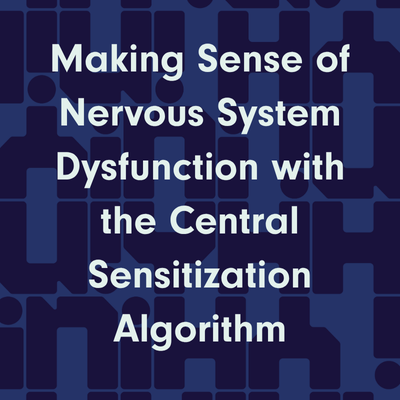
Treating Sacroiliac Joint (SIJ) Pain: A Clinician’s Guide
How to manage and treat sacroiliac joint (SIJ) dysfunction/pain.

Bridging the Divide: Right Treatment, Right Patient, Right Time
Matching the right treatment approach to the right patient - the therapeutic spectrum.

Navigating Difficult Conversations in Complex Medical Situations
How to communicate effectively in complex medical situations with patients, caregivers/support people, and providers.

Owning Your Care and Understanding the Doctor’s Perspective: A Patient Guide
How to navigate the medical system effectively with complex issues and communicate clearly with your provider as a patient.

How to Handle the Overwhelm of Managing Chronic Pain
What should you do when you get overwhelmed managing chronic pain.

Understanding and Treating Hypermobile Ehlers-Danlos Syndrome (hEDS)
Understanding and treating hypermobile Ehlers-Danlos (hEDS)

Making Sense of Nervous System Dysfunction with the Central Sensitization Algorithm
A treatment and management algorithm for central sensitization, or nervous system dysfunction.

Tackling Travel More Effectively: A Patients Guide
Strategies for patients to more effectively manage chronic pain when traveling.

Pacing - It’s Not a Dirty Word
A guide for patients to better understand the value and application of cognitive and physical pacing.

Managing Low Back Pain: A Practical Guide for Clinicians
Guide to help clinicians working their way through treatment and diagnosis of various causes of low back pain.

Conservative Pain Management: Building Blocks with the MARS Method
The different building blocks of conservative pain management using the MARS Method to address movement, awareness/agency, recovery and stress.

Treating Neuropathic Pain: A Practical Algorithm for Clinicians
A treatment algorithm to help guide clinicians diagnosis and treatment of neuropathic, or nerve pain.

Practical Tools For Pain Assessment: How to Use Questionairres
What questionnaires or outcome measures are particularly helpful to asses chronic pain and the various types present.

How to Draw Your Pain: Why It Matters and How to Do It Well
Why drawing accurate pain diagrams is crucial for diagnosing pain and how to do it most effectively.

Facing Pain Flares: Seeing Patterns & Mastering Your Response
Understand the different phases and personal warning signs of a pain flare so you can catch them earlier, and take quicker action to dig yourself out.

Setting Meaningful Goals for Managing Chronic Pain: A Patient’s Guide
How to work through the process of setting and prioritizing goals so you can more clearly define and execute your path towards progress.

A Clinician’s Guide to Widespread Pain and Sensitization
How to work through the complicated symptom clusters of central sensitization as a clinician so you can move from confusion to action.

What Else Do You Say? Expanding the Framework for Communicating About Chronic Pain
How can you explain pain in a way that doesn’t make patients feel it is in their head, but acknowledges the various factors in the experience.

The Real Harm in Saying “It’s All in Your Head”: Why the Words We Use Matter
Why and how telling patients pain is in their head creates harm and damages both the therapeutic relationship, and the ability of the patient to get better. Though the concept works for some, the damage it can also create in a significant percentage of patients cannot be overlooked.

A History of Hysteria: The Search to Understand Medically Unexplainable Symptoms
Confusing symptoms have baffled patients and clinicians alike for millennia. This tension has shaped centuries of medicine and led to the perspective of ‘it’s in your head’ when medicine can’t provide better answers due to understandable therapeutic and diagnostic limitations.
